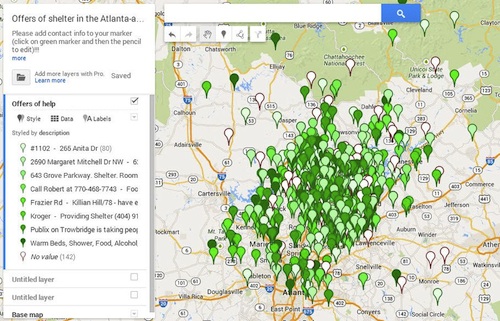This Atlanta situation — now thawing out — was undeniably a bit of a mess, but it could have been even worse if not for a Marietta woman named Michelle Sollicito. Working with another resident, Jelena Crawford, they created a SnowedOut Atlanta Facebook page; it got so popular that it had to be broken into sub-pages by region.
There were a couple of different features: a map that connected stranded motorists with nearby people offering shelter, for one. There was also a way to pin (GPS, basically) your last location before your phone died. By 11pm Tuesday night, 300 people were joining the main page every 15 minutes. Here’s what happened next:
“Everything was going so fast and furious,” said Crawford, anAtlanta business technologies consultant. “Once the map started having traction, there were other people shepherding it. These are total strangers and we never did a sidebar to sort of discuss what was happening.”
Eventually, Sollicito said the response overwhelmed Facebook.
“I had Facebook techies (contacting) me to ask if I could separate the group up into little groups because they couldn’t really deal with the demand,” she said Wednesday morning during an interview with blogradio.com “Live, Love, Laugh!” host Tosha Meredith.
Now, there was also a lot of documenting of chaos, for sure, like this example:
10th hour in the car. @ajclocaleditor &my 17th anniversary coming up. I think we're done with the "for worse" part pic.twitter.com/c8ZQPC5XGX
— Jennifer Brett (@Jennifer__Brett) January 29, 2014
Wrap your head around this for a second: in 2007, social media was basically Facebook, remnants of MySpace and Friendster, and the early stages of Twitter. It’s about 6-7 years later and obviously we have multiple platforms, but the actual connectivity has increased dramatically to the point where social media can help solve local problems. People will always use it to bitch about whatever, or throw in their quip on the latest major event (SOTU, Super Bowl, Grammys, et al), or just vaguely complain about their life … but in 10-20 years when we’re talking about social, the true value may be way above what advertisers/marketers can do on there or the ability of people to communicate their thoughts to a wide audience in an instant. The real value could be local. How can Twitter and NextDoor and Facebook and even Vine and whatever else help your community, in times of need or simply in times of day-to-day functioning? (And of course, how can someone somewhere make money off this local focus?) That’s an interesting next step, to me. Could a city run on Twitter predominantly? Obviously you’d need close to 70-80 percent legitimate buy-in, but it’s an interesting idea. Could a neighborhood within Kansas City have a Facebook page for everyone and share details of community events, trash pickup adjustments, etc. via there? Could social media change civic dynamics for the better? (The flip side is a potential reduction in face-to-face.)
This is the stuff I sit around thinking about / applying to jobs / writing this blog, but it’s cool to see it play out this way in Atlanta.
